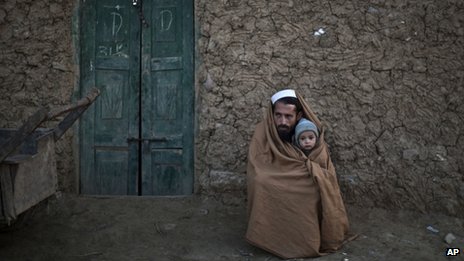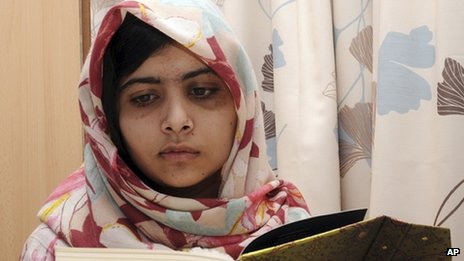Zeeshan S.
SENIOR MEMBER

- Joined
- Dec 19, 2005
- Messages
- 424
- Reaction score
- 0
The chairman of the governing party in Pakistan has told the BBC that the government will continue to use whatever means it can to persuade the Pakistan Taliban to take part in peace talks, even though the militants have already rejected the offer.
Senator Raja Zafar ul Haq went so far as to say they would refrain from making any critical comments about the militants as they try to convince them to come to the negotiating table.
"We don't want to spoil the atmosphere, that would be counter-productive," he said.
"I don't want to say anything against them which hurts their feelings."
Bombings and shootings
The senator would not be drawn on what common ground could be found with the Pakistan Taliban to make a deal possible, saying that would only become clear once they sit down and listen to the Taliban's demands.
But this conciliatory approach is causing alarm in some quarters here.
"That would demonstrate that the government and the state is extremely weak," says Talat Masood, a retired army general and now a leading commentator.

Many people have been displaced as a result of the conflict with the Taliban
"The militants would take advantage of this. You cannot afford to surrender to these forces which do not believe in the integrity of state and do not believe in the constitution and democracy."
The insurgency launched by the Pakistan Taliban six years ago aims to overthrow the current political system and impose a harsh form of Islamic or Sharia law.
Its campaign of bombings and shootings across the country has left thousands dead and injured, many of them civilians.
And after a US drone strike killed its leader on 1 November, the group is now under the command of a man with a particularly savage reputation called Mullah Fazlullah.
He used to be commander of the Pakistan Taliban in the Swat Valley region in the north-west of the country, which he and his fighters controlled between 2008 and 2009.
Beheaded
Mullah Fazlullah used a local radio station to spell out the rules of his new regime there, including a ban on girls - like Malala Yousufzai - from going to school and a requirement that women remain indoors.

The Taliban banned girls like Malala Yousufzai in Swat from getting an education
Those deemed to be opponents of the regime were flogged in public or hanged, the bodies dumped in the centre of the main town of Mingora as a warning.
Soldiers captured by the militants were beheaded.
It took a full-scale military operation to end Mullah Fazlullah's rule in the region and yet he has still been able to organise attacks there, including the near-fatal shooting of Malala Yousufzai last year.
Now as the new overall commander of the Pakistan Taliban, Mullah Fazlullah has rejected the government's peace initiative, according to his spokesmen.
His predecessor Hakimullah Mehsud had given some indications he would be prepared to talk but was killed in a US drone strike, which reportedly came just a day before a team of mediators was due to meet him.
The government's determination to press on with its attempts to reach a peace agreement with the Taliban even in these circumstances is particularly ironic.
The last peace deal which was agreed with the authorities was with Mullah Fazlullah and it gave him control of the Swat Valley.
According to security experts, the authorities - both civilian and military - have agreed a total of nine peace deals with Islamist extremists groups over the past decade.
If Pakistan is unable to do something with this network, the internal cohesiveness of Pakistan will be in question and perhaps implosion is a better word for it”
Professor Khadim HussainSpecialist on militant movements
Professor Khadim Hussain, a specialist on the militants, paints a bleak picture of the expansion of the Pakistan Taliban's network beyond its base in the tribal areas in the north-west, in part because of these deals.
'Heavy responsibility'
"The Taliban network got legitimised through the dialogue and those [peace] agreements," he said.
"They also had enough time to regroup, re-strengthen their recruitment and supply lines. And they got more time to disseminate their narrative of jihad and carry it forward and expand it."
He believes the militant group now has sleeper cells in most of the main towns and cities and fears Mullah Fazlullah is a leader who may activate them.
"If Pakistan is unable to do something with this network, the internal cohesiveness of Pakistan will be in question and perhaps implosion is a better word for it," Prof Hussain says.
"So now there is a heavy responsibility on the shoulders of the security establishment and political leadership to see that Pakistan remains intact and is not isolated from the rest of the world."
To achieve that, Prof Hussain argues the government must pursue a much broader policy including measures to challenge the extremist ideology which he says is gaining ground in society as well as in the state, and to stem the militants' sources of cash such as drugs and human trafficking.
But at the moment, the government's thinking appears to be narrow: Pursue peace talks, and if after several months there is no response from the Pakistan Taliban, then consider another military operation targeting its base in North Waziristan.
But even the alternative of a military operation may be in question because it is likely the government will want a consensus involving all the major political parties.
And that may prove difficult to achieve.
BBC News - Alarm over Pakistan's 'conciliatory' Taliban approach
Senator Raja Zafar ul Haq went so far as to say they would refrain from making any critical comments about the militants as they try to convince them to come to the negotiating table.
"We don't want to spoil the atmosphere, that would be counter-productive," he said.
"I don't want to say anything against them which hurts their feelings."
Bombings and shootings
The senator would not be drawn on what common ground could be found with the Pakistan Taliban to make a deal possible, saying that would only become clear once they sit down and listen to the Taliban's demands.
But this conciliatory approach is causing alarm in some quarters here.
"That would demonstrate that the government and the state is extremely weak," says Talat Masood, a retired army general and now a leading commentator.

Many people have been displaced as a result of the conflict with the Taliban
"The militants would take advantage of this. You cannot afford to surrender to these forces which do not believe in the integrity of state and do not believe in the constitution and democracy."
The insurgency launched by the Pakistan Taliban six years ago aims to overthrow the current political system and impose a harsh form of Islamic or Sharia law.
Its campaign of bombings and shootings across the country has left thousands dead and injured, many of them civilians.
And after a US drone strike killed its leader on 1 November, the group is now under the command of a man with a particularly savage reputation called Mullah Fazlullah.
He used to be commander of the Pakistan Taliban in the Swat Valley region in the north-west of the country, which he and his fighters controlled between 2008 and 2009.
Beheaded
Mullah Fazlullah used a local radio station to spell out the rules of his new regime there, including a ban on girls - like Malala Yousufzai - from going to school and a requirement that women remain indoors.

The Taliban banned girls like Malala Yousufzai in Swat from getting an education
Those deemed to be opponents of the regime were flogged in public or hanged, the bodies dumped in the centre of the main town of Mingora as a warning.
Soldiers captured by the militants were beheaded.
It took a full-scale military operation to end Mullah Fazlullah's rule in the region and yet he has still been able to organise attacks there, including the near-fatal shooting of Malala Yousufzai last year.
Now as the new overall commander of the Pakistan Taliban, Mullah Fazlullah has rejected the government's peace initiative, according to his spokesmen.
His predecessor Hakimullah Mehsud had given some indications he would be prepared to talk but was killed in a US drone strike, which reportedly came just a day before a team of mediators was due to meet him.
The government's determination to press on with its attempts to reach a peace agreement with the Taliban even in these circumstances is particularly ironic.
The last peace deal which was agreed with the authorities was with Mullah Fazlullah and it gave him control of the Swat Valley.
According to security experts, the authorities - both civilian and military - have agreed a total of nine peace deals with Islamist extremists groups over the past decade.
If Pakistan is unable to do something with this network, the internal cohesiveness of Pakistan will be in question and perhaps implosion is a better word for it”
Professor Khadim HussainSpecialist on militant movements
Professor Khadim Hussain, a specialist on the militants, paints a bleak picture of the expansion of the Pakistan Taliban's network beyond its base in the tribal areas in the north-west, in part because of these deals.
'Heavy responsibility'
"The Taliban network got legitimised through the dialogue and those [peace] agreements," he said.
"They also had enough time to regroup, re-strengthen their recruitment and supply lines. And they got more time to disseminate their narrative of jihad and carry it forward and expand it."
He believes the militant group now has sleeper cells in most of the main towns and cities and fears Mullah Fazlullah is a leader who may activate them.
"If Pakistan is unable to do something with this network, the internal cohesiveness of Pakistan will be in question and perhaps implosion is a better word for it," Prof Hussain says.
"So now there is a heavy responsibility on the shoulders of the security establishment and political leadership to see that Pakistan remains intact and is not isolated from the rest of the world."
To achieve that, Prof Hussain argues the government must pursue a much broader policy including measures to challenge the extremist ideology which he says is gaining ground in society as well as in the state, and to stem the militants' sources of cash such as drugs and human trafficking.
But at the moment, the government's thinking appears to be narrow: Pursue peace talks, and if after several months there is no response from the Pakistan Taliban, then consider another military operation targeting its base in North Waziristan.
But even the alternative of a military operation may be in question because it is likely the government will want a consensus involving all the major political parties.
And that may prove difficult to achieve.
BBC News - Alarm over Pakistan's 'conciliatory' Taliban approach

